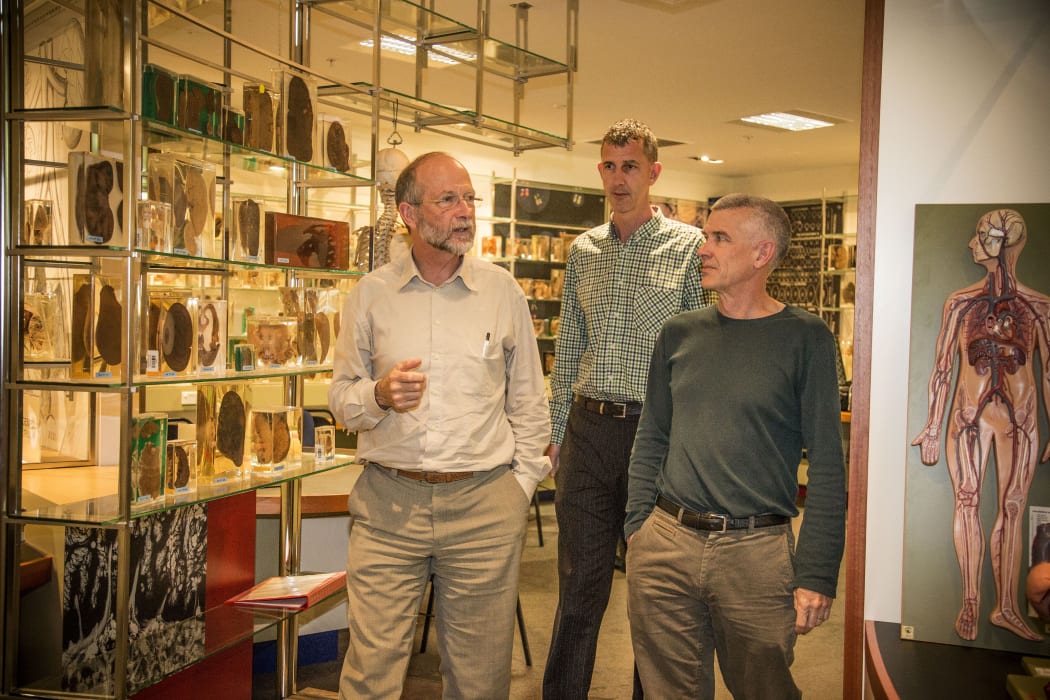
The winning team, from left, Professors Ian Reid, Mark Bolland and Andrew Grey. Photo: University of Auckland
Bone health scientists at the University of Auckland have been awarded the $500,000 Prime Minister’s Science Prize for research that shows that calcium and Vitamin D supplements are not beneficial, and can even cause harm.
Distinguished professor Ian Reid and associate professors Mark Bolland and Andrew Grey, who are all at Auckland University’s School of Medicine, have demonstrated that the supplements are ineffective in treating or preventing osteoporosis, and that taking calcium increases the risk of heart attacks in older people by as much as 30 per cent.
Professor Reid says many people believe that calcium is good for their bones, but that turns out to be a medical myth.
“We didn’t set out to be myth busters,” he says. “The key trial, the Auckland Calcium Study, which triggered our scepticism in this area, I designed with a view to prove once and for all the benefits of calcium on the skeleton and elsewhere … but what we found was quite the opposite.”
Following the Auckland study, Mark Bolland led a project that analysed data from several other clinical trials of calcium supplements, involving thousands of people, which confirmed that the supplements have no beneficial effects, but increase the risk of heart attack and cause several other side effects.
In every trial there’s a side effect that outweighs the benefit you get. In Ian’s trial, there were actually more women who had hip fractures and heart attacks than benefited from taking calcium. There’s an increased risk of kidney stones in another trail, and in another one people were admitted to hospital suffering from stomach complaints, and that was more common than preventing fractures. So when you go through and systematically review the evidence, the risks of calcium supplements in all trials, either individually or collectively, outweigh the benefits from them.
The findings prompted a 70 per cent reduction of calcium supplement prescriptions in New Zealand, which translates to savings of $1.5 million a year. Professor Reid says the response from the medical professions has been varied.
“Cardiologists know that there is calcium deposited in the arteries of their patients who have heart attacks, so they are not particularly surprised. Likewise, doctors who look after patients with kidney disease are very conscious of calcium deposition in arteries as the cause of death of many patients on dialysis.
“Within the bone community, most of us have been reared on the idea that calcium is the cause and cure of osteoporosis and it’s taken people a bit longer to come to terms with this information.”
The team found similar results for Vitamin D supplements, which are also widely used to treat bone disorders. Many studies have found associations between low Vitamin D levels and a wide range of conditions, including depression, high blood pressure and cardiovascular disease. Some have inferred that the low Vitamin D levels cause the medical conditions, but Professor Reid says Vitamin D deficiency is a consequence rather than a cause, because when people are unwell, they spend less time in the sun, which is essential for the body to produce its own Vitamin D.
“Those conditions may be associated with low levels, but giving people extra Vitamin D does not prevent those particular problems.”
The exception, he says, are frail or chronically ill people who stay mostly indoors. “Modest supplementation in hospitals and rest homes remains important to prevent the severe demineralisation of bones that happens with very low Vitamin D levels.”
Osteoporosis remains a risk for post-menopausal women and older men, but the team says the role of calcium in preventing or diminishing bone loss needs to be reviewed.
Most international organisations that provide advice to the public have backed off from endorsements of calcium supplements. Professor Reid says the factors that predict a person’s risk of developing osteoporosis include age, bone density, body weight, smoking and alcohol consumption.
“Perhaps the single most important public health message in terms of osteoporosis prevention is not to be too thin, particularly for women, and that applies from puberty.”
He says post-menopausal women should get a bone density test around the age of 65, and if the results indicate an issue with bone loss or fracture risk, they should consider taking medication to prevent further bone loss. For men he recommends the same, albeit about a decade later.
The team is now investigating why calcium supplements cause heart attacks and doing more research aimed at developing drugs to prevent osteoporosis. They started a trial of people in their 50s and 60s who have an intermediate risk of bone fracture. “They don’t actually have osteoporosis yet, but their bone densities are heading into that direction. We want to see if we can maintain their bone densities and prevent fractures over a 10 to 15 year period.
“Waiting until you’ve got osteoporosis and had fractures is a very short-sighted way of dealing with what is becoming almost a pandemic problem affecting more than 50 per cent of older women."
Professor Reid, who has been researching bone diseases since the 1980s, has also won the Rutherford Medal and the Liley Medal.
Other prize winners are:
The Prime Minister’s 2015 MacDiarmid Emerging Scientist goes to Alex Taylor from the University of Auckland for his work on the cognitive and problem-solving abilities of birds, particularly New Caledonian crows and kea.
The Prime Minister’s 2015 Science Teacher Prize has been won by Tania Lineham who leads the science department at James Hargest College in Invercargill.
The Prime Minister’s 2015 Future Scientist Prize has been won by 18-year-old, Georgia Lala from Auckland’s Diocesan School for Girls for the development of an innovative aquaponics system for growing edible plants indoors.
The Prime Minister’s 2015 Science Media Communication Prize has been presented to Ian Griffin, director of the Otago Museum and an Honorary Research Fellow at the University of Otago’s Department of Physics.

